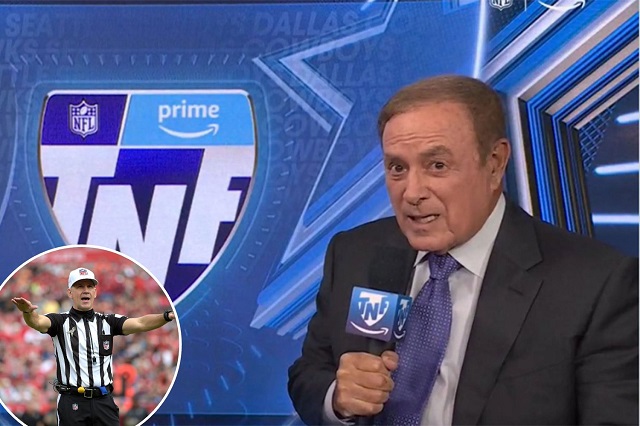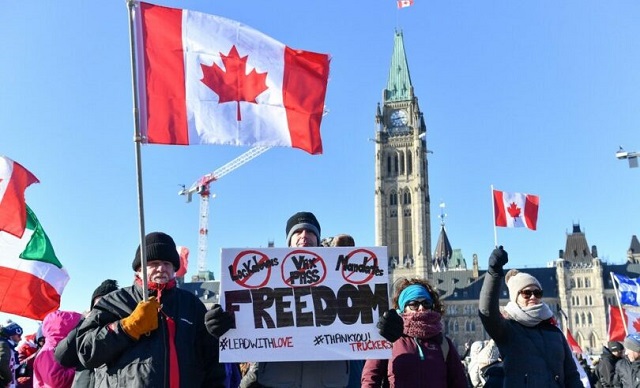Bruce Dowbiggin
When You Lose Al Michaels: We’ve Entered The Penalty Phase

NBC Sports has announced that legendary broadcaster Al Michaels will not be doing any NFL postseason games. No reasons were offered why the almost-octogenarian is getting shoved aside for lesser talents.
Which is too bad because Michaels’ insouciance is a remedy for the erratic product of the NFL. His not-so-subtle references to the betting lines and player props defies the approved league standards on topics not to be discussed openly during games.
He’s also been waging a guerrilla war against NFL officiating and the avalanche of penalty flags during games. See: the capricious call/ no call debate after last Sunday’s Kansas City loss to Buffalo thanks to an offside call. Showing insubordination doesn’t work for the suits in Manhattan and the video judges in New Jersey.
Not that refereeing gaffes are exclusive to the NFL. Michaels isn’t the only high-profile broadcaster to wonder WTF about refereeing. In March my old friend Peter Mansbridge invited me on his SiriusXM podcast The Bridge to discuss whether refereeing is on the level. This after then-Raptors star Fred VanVleet was fined $30 K for criticizing NBA refs.
Here— with an Al Michaels reference— is what we wrote after the podcast went to air. “Peter was wondering if the Raptors star had a legitimate beef with a league that has had gambling scandals with referees (hello Tim Donaghy). He’d also noted, as a season ticket holder in Toronto, that the NHL’s referees sometimes act as if they believe they are the reason the fans tune in. This sentiment gained credibility in 2021 when soon-to-be-former referee Tim Peel was caught on mic saying that, to balance a game, he wanted to give a penalty to Nashville regardless of no infraction.
We were unable to reassure Peter that this tension would resolve, as the influence of legal gambling has put results and the men who call them under ever-greater scrutiny. With the new massive revenues coming from casinos and online gambling advertising the leagues have an added imperative to guarantee the integrity of results by creating a surveillance state on refs and players.
The late pass-interference call against Philadelphia in the 2023 Super Bowl that swung tens (maybe) hundreds of millions in bets is indicative of the tightrope they now face. You take house money, you had better keep the house happy. Made worse when these calls are handled by part-time NFL referees or NHL refs who never face the media over their calls.

Lamenting the officials’ work is an age-old issue. In an earlier time, the vagaries were put down to “puck luck” or “bad breaks”. With little recourse, coaches, GMs and players bit a lip and hoped next time they’d be the beneficiaries. The gripes increased as leagues began using referees to create more scoring or prevent injuries, manipulating results. Fans noticed, and did not like it.
In December of 2018 we wrote, “It is a cliché in city planning that, adding roads to prevent congestion, in fact ends up in more cars and more congestion. IDLM was reminded of this seeming contradiction while watching another episode of Law & Order: NFL Crappy Refereeing. In this week’s episode, what was considered pass interference on Thursday is Saturday’s “let ‘em play”… Attempts to clarify what constitutes a catch open new vistas for opaqueness. Not a good look.
The reason for much of this confusion lies with the league’s attempt to prevent injuries by adding new rules to their rule book. As this (manipulation) has done to city streets, the additional nuance and subtext has only produced greater congestion in games. Endless referee conferences. Players dumbfounded. TV announcers criticizing.

And still the bodies are broken, the injury lists groan with victims and the fans simmer in disappointment. As they like to say, Epic Fail… The NFL has long been lauded for its ability to gerrymander the rules of its sport to encourage scoring and more dynamic plays. The result, however, is a rule book that more resembles the IRS tax code than any sporting competition.
“As Al Michaels laments, the flow of games is constantly interrupted by a scrum of referees huddling to divine which of the million NFL bylaws been breached. The (now Vegas) Raiders recently chalked up a record 23 (!) penalties accepted in a single game. As a result, games are unwatchable tedious.
“On most occasions there is some foul detected. But the proliferation of penalties says that the game might be too difficult to play by the Spanish Inquisition standards of the rule book. Any game that has more than five flags per team is a problem the league needs to address. And don’t get us started about consistency from one officiating crew to the next.”

And that quote was from 2018. Multiply the additional rules and complexities inflicted upon referees by leagues. Add in the visibility created by gamblers parsing every minute trend for an advantage. Increase the number of cameras covering a game by ten. Then season with analytics. It’s a recipe for conspiracy theories.
So, yes, Peter, the issues with refereeing have never been more prominent. But blame the leagues, not their employees, for making them worse.” You could call Al Michaels, however, if you to want a friendly reception for your suspicions.
Sign up today for Not The Public Broadcaster newsletters. Hot takes/ cool slants on sports and current affairs. Have the latest columns delivered to your mail box. Tell your friends to join, too. Always provocative, always independent. https://share.hsforms.com/16edbhhC3TTKg6jAaRyP7rActsj5
Bruce Dowbiggin @dowbboy is the editor of Not The Public Broadcaster A two-time winner of the Gemini Award as Canada’s top television sports broadcaster, he’s a regular contributor to Sirius XM Canada Talks Ch. 167. Inexact Science: The Six Most Compelling Draft Years In NHL History, his new book with his son Evan, was voted the seventh-best professional hockey book of all time by bookauthority.org . His 2004 book Money Players was voted sixth best on the same list, and is available via brucedowbigginbooks.ca.
Bruce Dowbiggin
Why Do The Same Few Always Get The Best Sports Scoops?

The Toronto Maple Leafs made the “what colour is that green light?” decision to fire their head coach Sheldon Keefe last week. The removal of Keefe after five years followed a dispiriting first-round playoff series loss to a very ordinary Boston Bruins team. Coaching may or may not have been the root cause of that loss. (Keefe himself admitted “teams are waiting for the Leafs to beat themselves”.)
The real reason for the firing is 1967, and we don’t think we need add more than that.
In essence, the management of MLSE— the owner of the Maple Leafs and a lot of other sports stuff in Toronto— needed to throw a body to the baying hounds of disappointment. Also known as Leafs Nation. Newly minted CEO Keith Pelley, fresh from the PGA Tour/ LIV psychodrama, was certainly not going to pay the price.
Nor was GM Brad Treliving who has only been on the job for two seasons. The key decisions on Toronto’s lopsided salary cap were decided long before Treliving occupied his desk. That left two people in vulnerable positions. 1) Maple Leafs president Brendan Shanahan, who has been drawing an MLSE cheque for a decade. 2) Keefe.
When was the last time you saw a coach fire a team president? Precisely. Keefe joins the list of (briefly) unemployed coaches who circulate in the NHL like McKinsey consultants. Shanahan gets a lukewarm mulligan from Pelley. But after the failure of the Kyle Dubas experiment— “who needs experience?”— and now just a single playoff series win in a decade Shanny’s best-before date has arrived.

Toronto Maple Leafs president Brendan Shanahan attends a news conference in Toronto on April 14, 2014. Toronto Maple Leafs president Brendan Shanahan said Peter Horachek will remain the team’s interim head coach until the end of the season. Shanahan met the media Friday for the first time since coach Randy Carlyle was fired on Tuesday. THE CANADIAN PRESS/Chris Young
Depending on who he and Treliving enlist to coach— remember, Mike Babcock was too tough and Keefe was probably too player friendly— it had better produce instant results. Because Shanny, the pride of Mimico, is out of chances. The coach choice will also be affected by whichever player or players that management decides are superfluous to ending the Leafs’ ridiculous run of misery.
The Leafs brass’ press conference last Thursday did little to shed light on what happens after Keefe’s expulsion. Just a lot of MBA determinism on a bed of baffle gab. A crabby Steve Simmons question/rant briefly threatened the harmony of the moment, but order was restored. And the media bitching switched from the press box to social media and podcasts.
Speaking of the fourth estate, the other unmentioned aspect of this story— indeed every story in the NHL these days— is just how it was revealed to the public. When people sipped their morning Tim’s or Starbucks the (almost) coincident bulletins came down the social media pike about Keefe’s dismissal.
Predictably, Chris Johnston of Sportsnet and Daren Dreger of TSN announced the breaking news within heart beats of each other. While there had been speculation on Keefe’s fate for days, the announcement coming from the networks duo confirmed the story in the minds of the industry. That allowed everyone else drawing a cheque as a hockey journalist to pile in and swarm the dead body.
In today’s sports journalism, where social media has replaced newspapers, scoops are governed by a protocol. There are the heralds— in the NHL it’s currently Johnston and Dreger— and then there are the disseminators. The days of a rabble of reporters all scrambling to get a story bigger than who-will-play-in-tonight’s-game are gone. Today, it’s a very narrow funnel for scoops.
It’s the same in the NFL where Ian Rappaport (NFL Network) and Adam Schefter (ESPN) monopolize the tasty scoops on behalf of their employers, who also happen to be NFL rights holders. In the NBA, Brian Windhorst (ESPN) has the inside rail when it comes to the LeBron James/ Steph Curry scoops. In MLB… it’s probably Ken Rosenthal (The Athletic) but no one cares about baseball anymore, do they?
The leagues like it this way, doling out stories to guys they can trust. None of this is criticism of Johnston or Dreger, who have deftly maneuvered themselves into the coveted “from their lips to your ears” spots. From our own experience we can remember the exhilaration of having the best source or sources on the really big stories. Like Johnston/ Dreger, we worked hard for a long time to develop those sources and only very reluctantly let anyone else horn in on our stories.
It was also our observation that this order of things journalistic suited a lot of reporters who either couldn’t get good sources or didn’t want the stress of being first on stuff. It was enough that, like the Keefe story, they’d get the goods eventually and most fans would not care who was first. So long as you had a take. So be it.
Some resentful types took potshots at our work if it upset their pals in the dressing room or the management suite. On the Stephen Ames/ Tiger Woods story in 2001, we had the late Pat Marsden tell us on air that we’d done a great job on Ames’ criticisms of Tiger. Only to hear him lambaste us— again on FAN 590— only minutes later as we listened driving home from the studio. But we digress.
Many reporters are complacent in playing the game, so long as their bosses didn’t enquire why they are getting scooped all the time by the same few rivals. With the death of daily newspapers that doesn’t happen much any longer. (Many editors today may only see stories when publication brings a libel notice.) For them a salty take is good enough.
The scoop business is also affected by the multiple roles now demanded of sports media types. In addition to their “day job” on a beat they also have to supply digital content and talk-back hits to the Mother Ship. Most also are feeding a weekly podcast, dictating time on air rather than time working the phone. There are only so many hours in a day to chase a story.
Better to play the Breaking News waiting game.
Bruce Dowbiggin @dowbboy is the publisher of Not The Public Broadcaster A two-time winner of the Gemini Award as Canada’s top television sports broadcaster, he’s a regular contributor to Sirius XM Canada Talks Ch. 167. Now for pre-order, new from the team of Evan & Bruce Dowbiggin . Deal With It: The Trades That Stunned The NHL & Changed Hockey. From Espo to Boston in 1967 to Gretz in L.A. in 1988 to Patrick Roy leaving Montreal in 1995, the stories behind the story. Launching in paperback and Kindle on #Amazon this week. Destined to be a hockey best seller. https://www.amazon.ca/Deal-Trades-Stunned-Changed-Hockey-ebook/dp/B0D236NB35/
Bruce Dowbiggin
Getting Real About Justin’s Real Estate Economy. It Won’t Last

Have you ever been to a concert where a hot new product like Tesla is mentioned and many in the crowd applaud in approval? Have you been at a dinner party when you say you went to a new Thai restaurant, and everyone at the table explodes in rhapsodic glee? Have you ever been to see a comic and he mentions he has the latest iPhone with the nifty camera and people actually cheer?
You see those people cheering a piece of tech or a style of cuisine? Those are the people who believed Justin Trudeau when he told them to sink everything into real estate when interest rates were near zero. They. Will. Believe. Anything. So long as they think it makes them cool kids. Trudeau could say he can control the weather by stopping cows from farting, and they’ll be wearing a bovine flatulence T-shirts pronto.

Now, we can hear you laughing in derision at our skepticism about the real estate-economy that has taken over the nation— the new economy that Justin fed, watered and then bragged about. (To the exclusion of the other cornerstones of our once-dynamic nation state.) The one that will be going to Market one of these days for a meeting with an air compressor.
Again, you laugh. Despite the housing shortage Justin says we can easily accommodate two million new souls a year, no problem. He says Trump was a vile racist for wanting to exclude unhinged radicals from zombie countries back in 2017. The freshly-arrived from Trump’s “shithole countries” with “shithole value systems” and “shithole economies’ will prop up the value of Canada’s two-million dollar cash-cow bungalow in West Van or Etobicoke. And the Happy People believe.
Why? Because Justin and his cabinet are in Control, and they’ll just rein in these types when they get here and start asking that Jews be exterminated or white people surrender the merit system to DEI droogs. That little dustup at the universities where nervous trust-fund virgins claim to be onside with systemic rape? Justin can stop them anytime. Everything is cool. After all, Canada is the model for a postmodern state.
And that stuff about how the Canadian real estate market being 80 percent propped up by drug money, kleptocracy profits and Blackrock? Pshaw. That is just the Far Right Diagolons trying to panic you into hiding your money from the government which just wants to send it to the “shithole” countries in a kickback loop. If nothing else, the banks will save you— if there’s any shareholder value left after this deranged DEI diversion.
Can’t happen here? We know people who were around the EU in 2008 when the U.S. mortgage debacle cratered economies around the world. For years they’d been served by Poles in the service industry, Spaniards in the restaurant kitchens and Bulgarians doing the physical labour. Life was good. Everyone drove a Beemer and owned a condo overlooking the sea.
Then, one day, they noticed that all the airport parking lots were overflowing with Beemers that went unclaimed. No one had paid rent in months. The banks noticed that all these lovely fellow citizens of the EU had drained their savings, reached their cash credit limit on the Mastercard and skedaddled with the dough. Funny, they all must have gone on holidays to once, no?

No. They were gone. Bye bye. Adios. And the credit bubbles in Ireland, Norway, Iceland, France and other EU worthies popped like the champagne they’d been sipping for years on easy credit and idiotic notions of productivity. Nations like Iceland went bankrupt overnight. Counties in England threw their keys on the table. People’s life savings evaporated.
But Justin says that won’t happen here on his co-watch with Jagmeet the Bespoke. Sure, no one under the age of 40 can afford those two-million dollar cash-cow bungalows in West Van or Etobicoke. But those old Boomer geezers will die soon, and after we tax the daylights out of the estate, the kiddos will inherit the house. Probably after we turn it into a four-plex or fine them for having empty bedrooms because they couldn’t afford kids.
One of the ferocious beauties of market economies is their way of periodically turning on themselves when too many people are getting rich too easily. The Canadian RE economy of Justin Trudeau is one of them. It’s about a decade old without any sign of dropping. Life is good. Everyone drives a Tesla and rents a condo overlooking the sea.
Little wonder. Everything he and his faculty lounge of dimwits like Chrystia Freeland, Melanie Joly and Steven Guilbeault have done this decade has been to prop up the value of real estate owned by their real pals in Asia, Europe, the assorted kleptocracies in Africa or the sub-continent. It was like an ad for Chlorox the way these “investors” blithely laundered their dirty money in Canadian condos and low-rises. When news leaked out that mobsters were using casinos in B.C. (where Justin’s maternal side came from) as a laundering station it was covered up very quickly.
But the clock ticks. Even Justin’s former finance minister Bill Morneau is warning that the bubble is going to pop if Justin keeps printing more money to keep the real estate values so unsupportably high. The entire middle class of Canada, which has ridden the real estate train, will see their life savings evaporate like Jody Wilson Raybould’s political career.

No matter. Justin’s been living in government housing since 2015 (some of it with his Mommy). What does a trust-fund nit know about making rent cheques or a mortgage payment? Without Sophie spending like a dervish, he never needs to look at an America Express card again. He’s got 17 more months to build up credits with his future benefactors, and he’s not applying the handbrake now.
Okay, you can applaud now.
Bruce Dowbiggin @dowbboy is the editor of Not The Public Broadcaster A two-time winner of the Gemini Award as Canada’s top television sports broadcaster, he’s a regular contributor to Sirius XM Canada Talks Ch. 167. Now for pre-order, new from the team of Evan & Bruce Dowbiggin . Deal With It: The Trades That Stunned The NHL & Changed Hockey. From Espo to Boston in 1967 to Gretz in L.A. in 1988 to Patrick Roy leaving Montreal in 1995, the stories behind the story. Launching in paperback and Kindle on #Amazon this week. Destined to be a hockey best seller. https://www.amazon.ca/Deal-Trades-Stunned-Changed-Hockey-ebook/dp/B0D236NB35/
-

 Uncategorized2 days ago
Uncategorized2 days agoRCMP recruitment failure has Alberta advocacy group calling for Provincial Police Service
-

 Automotive21 hours ago
Automotive21 hours agoGovernments in Canada accelerate EV ‘investments’ as automakers reverse course
-

 Economy24 hours ago
Economy24 hours agoBiden signs suicidal ‘No Coal’ pact, while rest of world builds 1,000 new plants
-

 COVID-191 day ago
COVID-191 day agoJapan’s most senior cancer doctor: COVID shots are ‘essentially murder’
-

 Health14 hours ago
Health14 hours agoSouth Korean president declares low birth rate a ‘national emergency,’ plans new ministry to address it
-

 Health2 days ago
Health2 days agoPrivate Footage Reveals Leading Medical Org’s Efforts To ‘Normalize’ Gender Ideology
-

 Health2 days ago
Health2 days agoTHE WPATH TAPES: Behind-The-Scenes Recordings Reveal What Top Gender Doctors Really Think About Sex Change Procedures
-

 COVID-192 days ago
COVID-192 days agoTrudeau government only sought legal advice after Emergencies Act was invoked, records indicate







